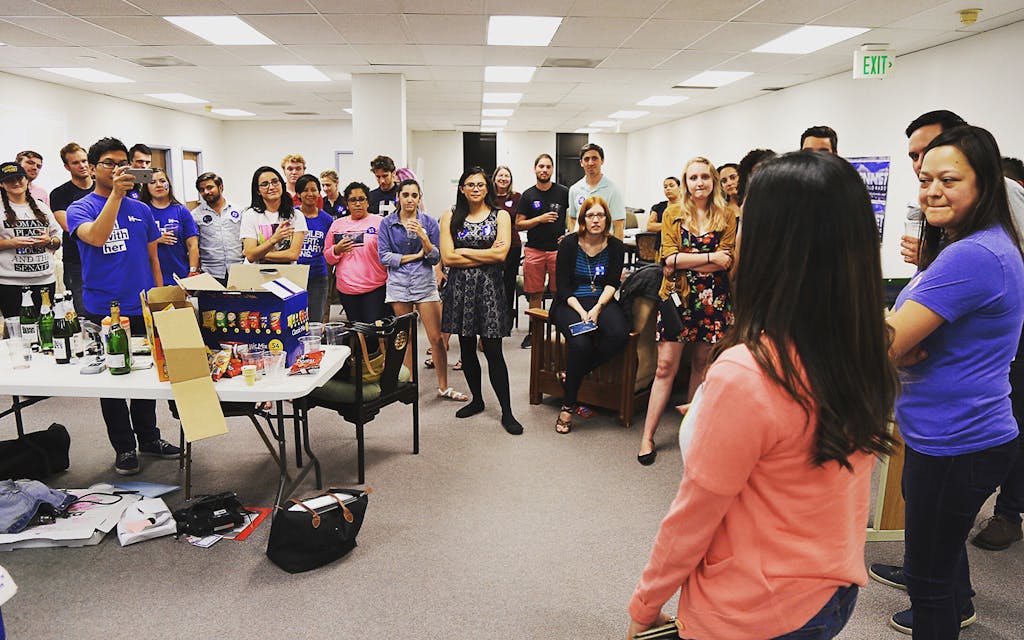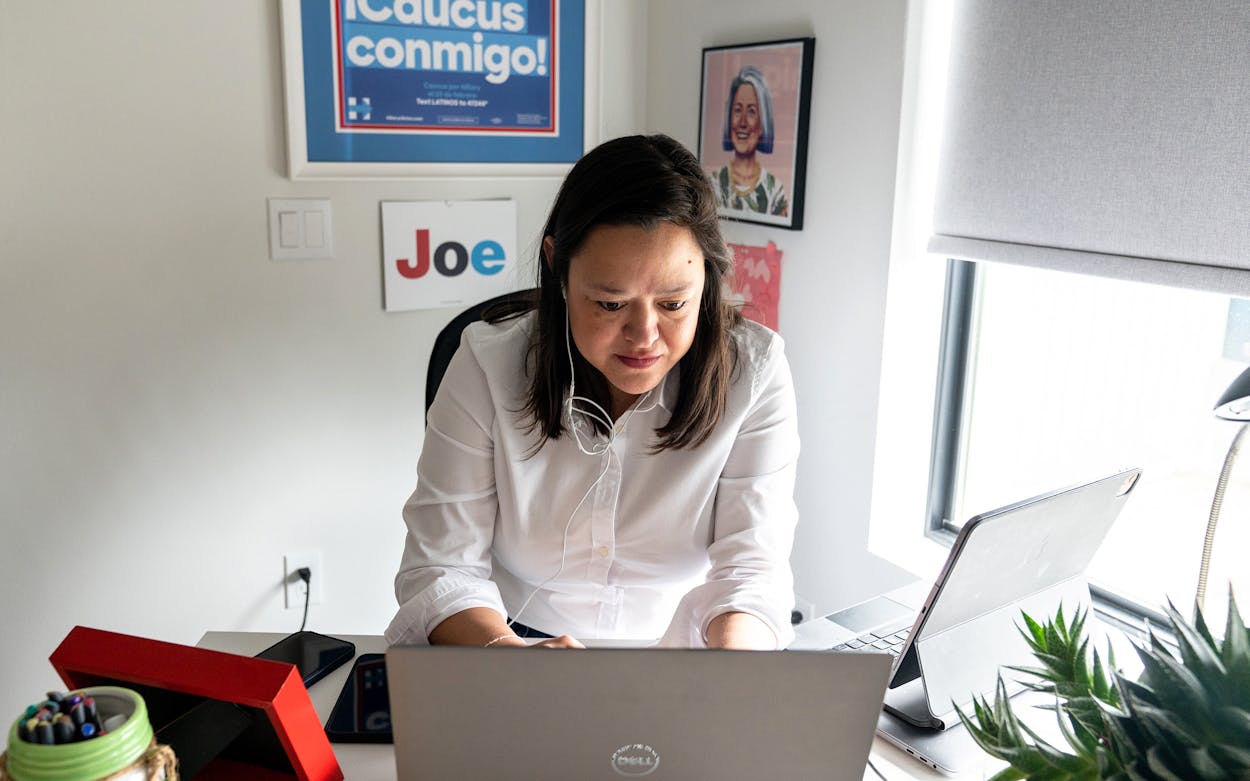Trey Martinez Fischer, a Texas state representative from San Antonio, was addressing Vice President Kamala Harris, seated across the sixteen-foot mahogany conference table in the Roosevelt Room, close by the Oval Office. All the remaining seats at the table were occupied by Texas lawmakers who had been invited to the White House. Harris had greeted the group as “courageous leaders” and “American patriots” because many of them were Texas House members who had staged a walkout near midnight on the eve of the last day of the legislative session, denying Republicans the necessary quorum to advance a bill to impose new restrictions on voting in the state. But as Martinez Fischer spoke, he redirected the praise back to a White House staffer in the room, Natalie Montelongo, deputy director of Biden’s Office of Political Strategy and Outreach.
Montelongo had sent him a text on May 29, just as Black and Latino representatives were meeting on Zoom to consider the possibility of a walkout the next day, Martinez Fischer said. She had alerted him to the president’s statement calling the voting bill “un-American” and “an assault on democracy.” “It was very clear to me after reading the statement that the eyes of the nation were looking at Austin, Texas, and the need to be bold and to be decisive, and we needed to react accordingly,” Martinez Fischer told me later, recounting what he had said in the Roosevelt Room. “Frankly, I think that was the spark that told us that breaking the quorum was the democratic thing to do.”
The close eye the White House is now keeping on Texas has a lot to do with Montelongo and her boss, Emmy Ruiz. Montelongo was born in Harlingen in 1986, but spent some of her early years in Matamoros, Mexico, across the Rio Grande, where her father works as a doctor, before moving to Brownsville. Ruiz, the director of political strategy and outreach, was also born in Harlingen to Mexican immigrant parents, three years earlier, and grew up a few miles away in the little Rio Grande Valley town of La Feria.
Montelongo and Ruiz’s job is to provide the Biden administration intelligence on what’s happening politically at the state and local level and to harness the support of community groups and progressive activists. That old, white Joe Biden has entrusted the White House political operation to two 30-something Latina operatives from the Rio Grande Valley is both surprising and important for Texas. State Democrats, insisting that theirs would be “the biggest battleground state” in the country in 2020, had felt slighted by the Biden campaign: he didn’t visit Texas during the general election, while Harris made only a single visit. State Democrats also had felt unloved by the Biden administration, in its early days, which crafted a cabinet sans Texans.
Ruiz’s and Montelongo’s appointments, however, are a sign that Biden believes that Latinos are key to his policy agenda, as well as an acknowledgment that even if his own reelection in 2024 does not depend on winning Texas, the party’s long-term interests require that it figure out the state. Now Texas Democrats are getting a taste of the exhilaration of being at the top of mind in the White House, of leading the news and helping set the national agenda. Wednesday, with their heroes’ welcome at the White House, was their best day in a long time.
“We got to talk about the importance of this moment, and that things don’t just happen, people make them happen,” Rafael Anchía, a state representative from Dallas, said of the conversation he had with Montelongo as they left the White House meeting. “It just underscores how important it is to have Texans so close to the seat of decision-making.”
Though they grew up only about thirty miles apart, Montelongo and Ruiz first met in 2015, when they worked on Hillary Clinton’s campaign in Nevada and helped her earn a crucial victory over Bernie Sanders in the 2016 caucuses. The win established Ruiz, who directed the effort, as a political wunderkind. She went on to command Clinton’s successful general election campaign in Colorado, with Montelongo in tow, and then in 2019 Harris tapped Ruiz as a senior adviser to her presidential campaign.
After working for Clinton, Montelongo led the nonprofit Voto Latino’s national campaign to register and mobilize Latino millennials in the 2018 midterm elections. She then served as national campaign strategist for immigrant rights for the ACLU, leading protests against Donald Trump’s family separation policy. In 2019, she became the political director of Julián Castro’s bid for the Democratic presidential nomination. In that role, she midwifed the rebirth of a fairly cautious politician as a cutting-edge progressive, leading the way on issues from policing to immigration. “Natalie was the conscience of the campaign,” Castro said.
That Ruiz and Montelongo would end up running the Biden White House political office defies the usual political calculation. Their bosses, Harris and Castro, offered the most direct attacks on Biden of any candidates during the Democratic debates in 2019. Harris challenged Biden’s record on school busing, while Castro badgered him about “forgetting already what you said just two minutes ago,” which was roundly criticized as an unseemly attack on then-76-year-old’s mental fitness.
“If you come for the king, you best not miss,” Montelongo tweeted that night. Castro missed and Montelongo is now working for the king, thanks in part to Ruiz. When Harris was announced as Biden’s running mate, Ruiz became close with his staffers. She was appointed to the administration in January. On April 20, Montelongo was announced as Ruiz’s deputy.
Ruiz and Montelongo see themselves as advocates first. “We are both organizers,” Montelongo said during a Zoom interview last month. “We started our careers as organizers in politics, and we still think and act as organizers.”
Nonetheless, in its early months, the Biden administration has been caught in the crossfire on immigration, taking heat from the GOP and organizers alike. The Rio Grande has once again become a pilgrimage site for Republican politicians who view it as the Biden administration’s River Styx. Biden tapped Harris to find a fix for the crisis (she is also the point person on voting rights). Her admonition at a press conference in Guatemala to would-be immigrants—“do not come, do not come”—drew condemnation from immigrant rights groups who said it ignored both the right to seek asylum and American complicity in creating the dire conditions that many Central Americans are fleeing.

Three civil rights groups active in the Rio Grande Valley—La Unión del Pueblo Entero (LUPE), the RGV Equal Voice Network, and the Texas Civil Rights Project—gave the Biden administration “meh” to mostly failing grades for its first one hundred days. They contend the administration has been stronger on symbolism than substance, doing little to undo Trump’s militarization of the border. But having two hometown girls in the inner sanctum buys the Biden administration the benefit of the doubt from some activists. “I have full trust in Emmy and Natalie,” said Dani Marrero Hi, director of advocacy and communications at LUPE, who worked closely on border issues with Montelongo when the latter was with the ACLU. “There’s no silver bullet to get all of what we want done, but it definitely feels good to know that we have our community organizing here on the ground, and then we also have people directly in the White House who share our experience and who are trying to push their values forward, all the way there in D.C.”
Ruiz is fluent in her defense of the administration. “The last administration completely dismantled the immigration system, and so we’re rebuilding,” she said when we talked in early May. “We are making a tremendous amount of progress in particular here in Texas with unaccompanied minors.”
As for the hope of turning Texas blue, Ruiz and Montelongo might face even more resistance. I asked Montelongo about Republican gains in 2020 in the Rio Grande Valley, traditionally a Democratic stronghold. “I feel like competition is welcome in the Valley. I think that for a long time, we hadn’t we haven’t had a lot of energy,” she replied. “Having people compete for someone’s vote is good, and it’s welcome and it’s healthy.”
As it happens, there is an opening in the Thirty-fourth Congressional District, which includes Montelongo’s hometown of Brownsville. Democratic representative Filemón Vela is not seeking reelection, and Republicans are targeting the district where Trump won 38 percent of the vote in 2016 and 48 percent in 2020. On the day Vela announced he wasn’t seeking reelection, Sawyer Hackett, who was Castro’s press secretary in his presidential campaign, tweeted he was launching an informal effort to draft Montelongo to run for the seat. Castro has encouraged her to consider it.
She hasn’t ruled it out. In early April she tweeted, “More women of color running for office is infrastructure.” A few days later she got her job at the White House.
- More About:
- Politics & Policy
- Rio Grande Valley






